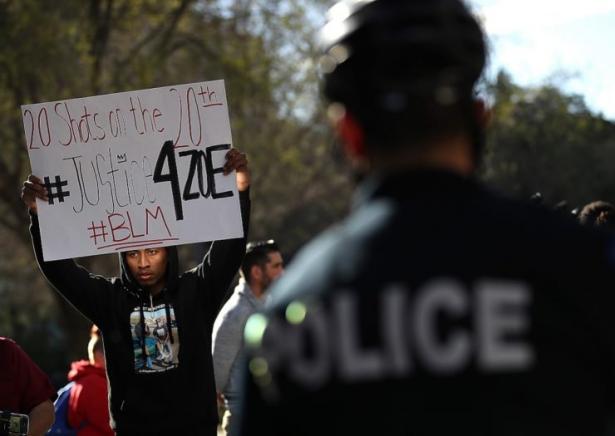Stephon Clark was shot by Sacramento police eight times, three times in the back, while in his grandmother’s backyard. The story is familiar: It was dark. Clark was a suspect. Police officers perceived a weapon.
“These officers reacted to the threat as they perceived it. As such, their actions are legally justified,” Sacramento Police Officers Association President Timothy Davis wrote on Facebook a week after the incident. What followed was described in a variety of different ways by the media: A shooting. A death. A killing.
There are no enforceable statewide body camera laws in California. Because of the unspecific rules about when it is appropriate to mute audio recording of police body cameras in Sacramento, seven minutes after Clark was shot, police muted their body cameras. California’s Democratic supermajority has failed for years to pass any substantial statewide policy regarding the use of police body cameras. Legislators have primarily taken a business-as-usual approach at both the national level and the state level, unable to form consensus on what police accountability reform might look like.
Last week, working with the family of Stephon Clark, Assemblymember Shirley Weber (D-San Diego) introduced a bill, AB 931, that aims to change that.
“We have been deeply saddened and frustrated by the killing of Black and brown men by law enforcement. It seems that the worst possible outcome is increasingly the only outcome that we experience,” Weber said in a press conference last Tuesday, with several members of the California Legislative Black Caucus standing behind her.
Weber’s bill would change the standard for when police officers can or should use deadly force from “reasonable force” to “necessary force,” with the hope that it will curb the use of deadly force on civilians (or allow easier prosecution of officers in cases when force is blatantly unwarranted). The California Police Chiefs Association opposes the bill, saying it jeopardizes public safety.
Police kill more people in California than in any other state. From 2013 to 2017, there were 929 cases of police killings in California—primarily Black or Latinx men, according to Mapping Police Violence, a research collaborative. Texas had the second most police killings during the same time period, with 493.
“The public’s activism in the last few weeks and their energy has been truly inspiring,” Weber said of the protests and marches around the United States and in Sacramento following Clark’s death. “It is time now that we as legislators match that energy and do the right thing by pushing for smart and effective reform.”
State Sen. Nancy Skinner (D-Berkeley) introduced new language last week for SB 1421, which would require law enforcement to release public records in cases of dishonesty in reporting, investigating, or prosecuting a crime; on the job sexual assault; and any discharge of a firearm or use of force that results in serious injury or death. The California Police Chiefs Association opposes the bill.
Pastor Les Simmons of the Build. Black. Coalition, a partnership of local nonprofits and activists in Sacramento, said the group initially moved to support Clark’s family, but has since started to push for policy change around police accountability.
“Use of force amendments haven’t been changed since 1842. That’s in itself is wrong. It’s really time that we really lean in on the police culture of police killings in California,” said Simmons. “It’s immoral. It’s unconstitutional. Inhumane. And we demand an end to police violence. And this bill is definitely a step in the right direction to ensure that law enforcement are better equipped to serve with better accountability when policy is not followed.”
Tanya Faison, founder of Black Lives Matter Sacramento, echoed a similar sentiment, with an air of caution.
“If it passes, then I think AB 931 would be one step in the right direction. I think there are a lot of steps that need to happen. I think that the bill, along with SB 1421 and other bills that are supposed by introduced—all of those together make a bigger picture of what needs to happen,” Faison said. “It is a step in the right direction, but it’s a small step.”
Gabe Schneider is a journalist from LA who writes about racial disparities and the built environment.


Spread the word